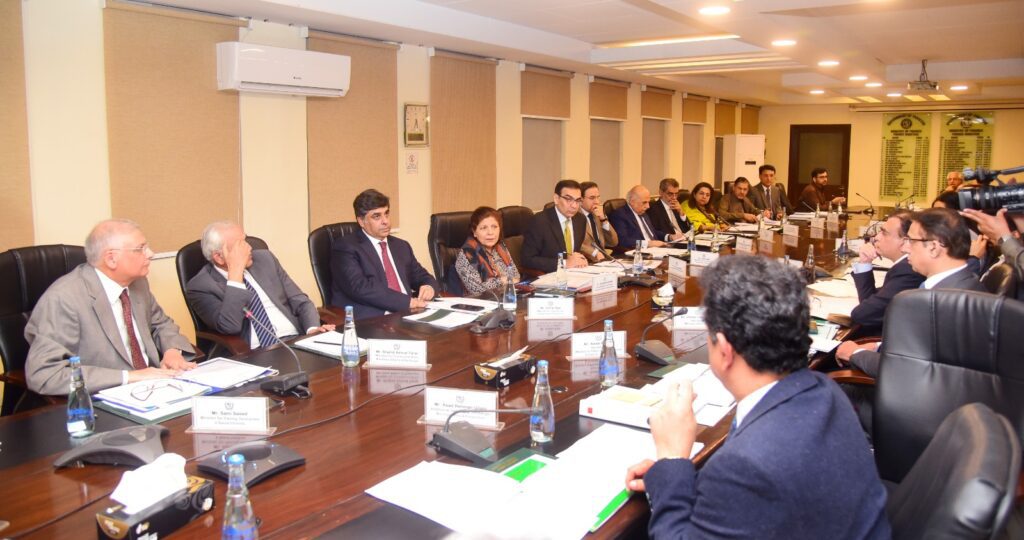- Web Desk
- Feb 24, 2026
ECNEC approves 10 uplift projects worth Rs372 billion
-

- Web Desk Shahzad Paracha
- Dec 11, 2023

ISLAMABAD: The Executive Committee of the National Economic Council (ECNEC) has approved 10 development projects amounting to a total of Rs372 billion.
According to the Finance Division, Caretaker Federal Minister for Finance, Revenue & Economic Affairs Dr Shamshad Akhtar chaired the ECNEC meeting on Monday.
The ECNEC sanctioned the Khyber Pakhtunkhwa Food Security Support Project, with a total cost of Rs25 billion. The initiative is designed to tackle climate vulnerabilities, enhance food security, and improve the livelihoods of rural farm households, addressing mid-and long-term institutional capacity needs in the flood-damaged districts of KP province.
The project, scheduled for a five-year tenure, will be implemented across seven districts of Khyber Pakhtunkhwa, including Upper Dir, Swat, Malakand, Charsadda, Peshawar, Nowshera, and DI Khan.
Furthermore, the ECNEC approved the “Sindh School Rehabilitation Project under Flood Restoration Programme (ADB emergency assisted)” at a total cost of Rs86 billion, with the provincial government contributing Rs7.5 billion and an ADB loan of Rs7 billion.
The project aims to rehabilitate 1,607 schools in severely affected districts: Dadu, Khairpur Mirs, Larkana, Nausharu Feroze, and Qambar Shahdadkot.
ECC defers proposal seeking hike in retail price of 262 drugs
The ECNEC also granted approval to the Khyber Pakhtunkhwa Human Capital Investment Project (KP-HCIP) on the education component, focusing on refugees & host communities regional sub-windows SH. The project, valued at Rs32.8 billion, will involve the rehabilitation and reconstruction of 1,165 damaged schools in 13 districts of KP.
In a bid to empower the youth, the ECNEC gave the green light to the “Prime Minister’s Laptop Scheme,” to be implemented through the Higher Education Commission (HEC), with a total cost of Rs16.8 billion.
Another significant approval is the Khyber Pakhtunkhwa Human Capital Investment Project (KP-HCIP) under the health component, amounting to Rs24.2 billion.
The project aims to enhance the availability, utilization, and quality of primary healthcare services for host communities and refugees through the provision of essential medicines, family planning commodities, hospital waste management, and outsourcing of lab/pharmaceutical/janitorial services.
The ECNEC also considered and approved the “Women Inclusive Finance” project at a total cost of Rs31.4 billion, aiming to reduce constraints on Pakistani women in accessing credit by providing a Credit Line Facility (CLF) for increased lending opportunities.
Additionally, the ECNEC approved the Ministry of Railways’ project, “Thar Coal Railway Connectivity,” connecting it with the existing railway network, including Last Mile Connectivity with Port Qasim, at a total rationalized cost of Rs53.7 billion, with a Local FEC of Rs8.1 billion, based on a 50:50 ratio between the federal government and the government of Sindh.
The ECNEC also gave the go-ahead for the Ministry of Communications’ project, “Peshawar Northern Bypass Project (PNBP),” with a total cost of Rs27 billion, excluding FEC. The project involves the construction of a 32.20 km, 4-lane bypass on the northern side of Peshawar, passing through agricultural land with associated facilities. Approximately 3,430 kanals of land will be acquired for the 55m Right of Way (ROW) requirement.
However, the Greater Thal Canal Project (Phase-II) was deferred, with directives to the Ministry of Planning, Development and Special Initiatives and the Ministry of Water to develop a comprehensive summary of the status of consultations among provinces and the implementation of past ECNEC decisions on the matter.
Lastly, the ECNEC considered and approved the Sindh Barrage Improvement Project (Phase-II) submitted by the Ministry of Water Resources. The project includes the rehabilitation and modernization of Sukkur Barrage and remaining works for the rehabilitation and modernization of Guddu Barrage at a total cost of Rs74.6 billion.




